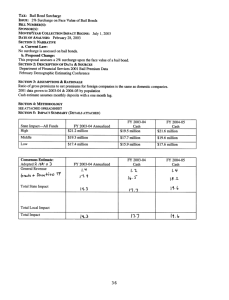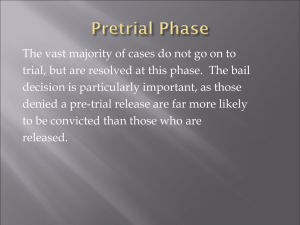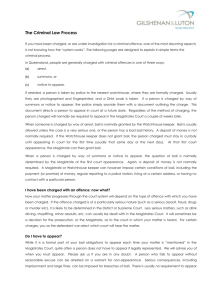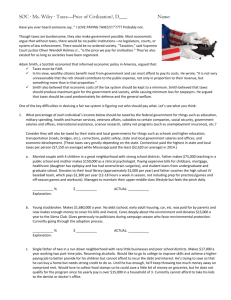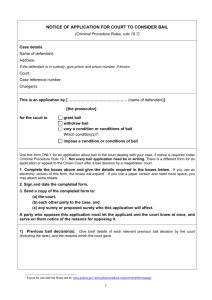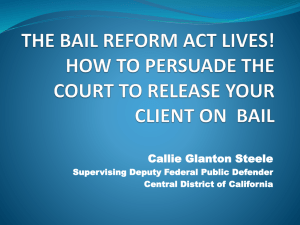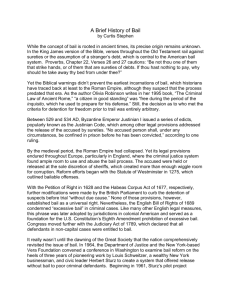Terms of reference Post Title: Consultancy on development of a
advertisement
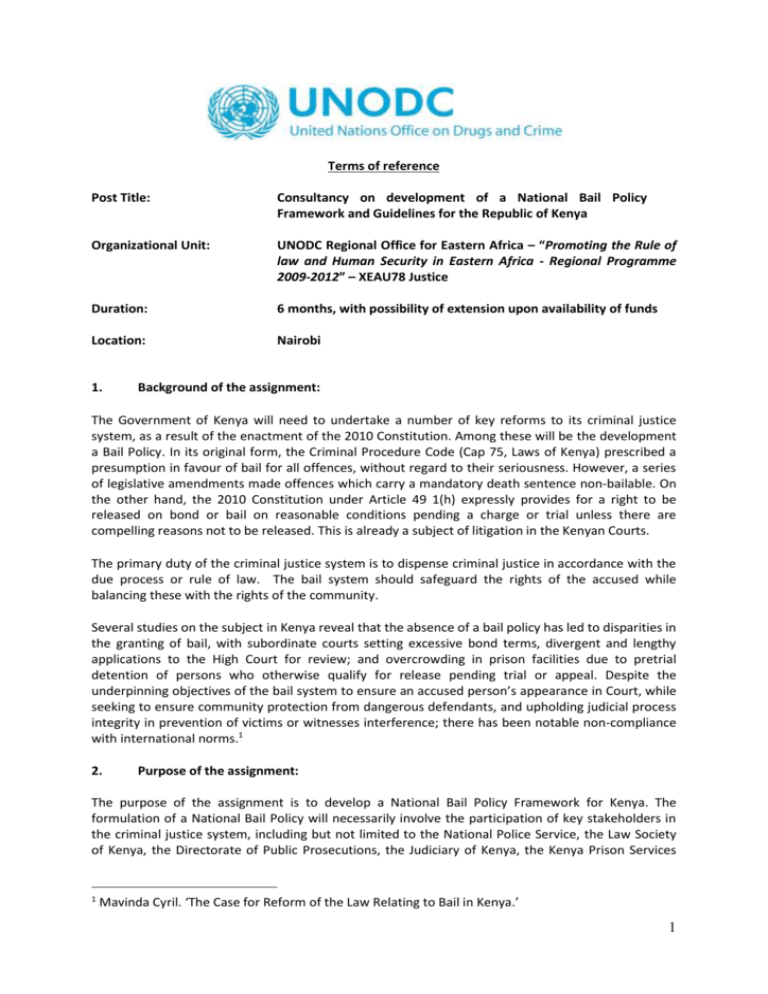
Terms of reference Post Title: Consultancy on development of a National Bail Policy Framework and Guidelines for the Republic of Kenya Organizational Unit: UNODC Regional Office for Eastern Africa – “Promoting the Rule of law and Human Security in Eastern Africa - Regional Programme 2009-2012” – XEAU78 Justice Duration: 6 months, with possibility of extension upon availability of funds Location: Nairobi 1. Background of the assignment: The Government of Kenya will need to undertake a number of key reforms to its criminal justice system, as a result of the enactment of the 2010 Constitution. Among these will be the development a Bail Policy. In its original form, the Criminal Procedure Code (Cap 75, Laws of Kenya) prescribed a presumption in favour of bail for all offences, without regard to their seriousness. However, a series of legislative amendments made offences which carry a mandatory death sentence non-bailable. On the other hand, the 2010 Constitution under Article 49 1(h) expressly provides for a right to be released on bond or bail on reasonable conditions pending a charge or trial unless there are compelling reasons not to be released. This is already a subject of litigation in the Kenyan Courts. The primary duty of the criminal justice system is to dispense criminal justice in accordance with the due process or rule of law. The bail system should safeguard the rights of the accused while balancing these with the rights of the community. Several studies on the subject in Kenya reveal that the absence of a bail policy has led to disparities in the granting of bail, with subordinate courts setting excessive bond terms, divergent and lengthy applications to the High Court for review; and overcrowding in prison facilities due to pretrial detention of persons who otherwise qualify for release pending trial or appeal. Despite the underpinning objectives of the bail system to ensure an accused person’s appearance in Court, while seeking to ensure community protection from dangerous defendants, and upholding judicial process integrity in prevention of victims or witnesses interference; there has been notable non-compliance with international norms.1 2. Purpose of the assignment: The purpose of the assignment is to develop a National Bail Policy Framework for Kenya. The formulation of a National Bail Policy will necessarily involve the participation of key stakeholders in the criminal justice system, including but not limited to the National Police Service, the Law Society of Kenya, the Directorate of Public Prosecutions, the Judiciary of Kenya, the Kenya Prison Services 1 Mavinda Cyril. ‘The Case for Reform of the Law Relating to Bail in Kenya.’ 1 and local and international civil society actors. A multi-agency approach strategy will be imperative in building the capacity of the criminal justice agencies to offer an effective bail system. 3. Specific tasks to be performed by the consultant: Under the overall supervision of the Representative in the UNODC Regional Office for Eastern Africa (ROEA) and the direct supervision of the UNODC ROEA Head of the Criminal Justice Programmer, the incumbent will perform the following substantive duties and responsibilities: (a) Conduct interviews with relevant partners and undertake specialized research in relation to the development of the National Bail Policy Framework Guidelines for the Administration of Bail; (b) Draft a National Bail Policy Framework and Guidelines for the Administration of Bail in consultation with the National Council on the Administration of Justice, and provide them to UNODC within agreed timelines; (c) Facilitate the working sessions, related to the drafting process; (d) Facilitate legislative and literature research related to National Bail Policy Framework Guidelines for the Administration of Bail; (e) Facilitate provision of materials and documents on international standards in the field of sentencing, crime prevention and criminal justice; (f) Develop a training programme and curriculum on the Guidelines for the Administration of Bail; (g) Conduct a pilot training of trainers programme for selected justice officials; (h) Provide interim and final reports, including recommendations for further technical assistance needs of the beneficiary, as well as development of legislation, submitted at the end of the assignment respectively. 4. Expected tangible and measurable output(s): (a) Technical direction and facilitation of the National Bail Policy Framework development process to the completion stage; (b) A Draft National Bail Policy Framework and Guidelines for the Administration of Bail and in line with 2010 Constitution of Kenya and international norms and standards; (c) Training programme and curriculum on the Guidelines for the Administration of Bail; (d) Recommendations on adoption and further implementation of the National Bail Policy Framework and Guidelines for the Administration of Bail. 5. Dates and details as to how the work must be delivered: The consultant will work under the overall supervision of the Regional Representative in the UNODC Regional Office for Eastern Africa (ROEA) and the direct supervision of the UNODC ROEA head of the Criminal Justice Programme. The consultancy is to be performed over 6 months starting during the first quarter of 2012. 6. Indicators to evaluate the consultant’s performance: Quality and timeliness of the assistance to UNODC; Quality of the draft National Bail Policy Framework and the facilitation of the development process; Effective use of the outcome by UNODC in future technical assistance to the Government of 2 Kenya in the area of criminal justice reform. 7. Qualifications/expertise sought (required educational background, years of relevant work experience, other special skills or knowledge required): Advanced University Degree in Law, Criminology or Social Sciences; Extensive experience in drafting policies and guidelines in the criminal justice sector; Demonstrated experience of working with a wide range of national stakeholders; Experience in working with international organizations; Excellent analytical and evaluative skills; Excellent communication and drafting skills in English. Knowledge of local languages, justice system and culture in Kenya is an asset. Interested and qualified candidates should send a Cover Letter and Personal Resume (CV) to easternafrica@unodc.org no later than COB Tuesday, 20 December 2011. Please indicate 001/UNODC ROEA/ GoK/Consultancy Bail Policy in the subject heading of your email. 3
